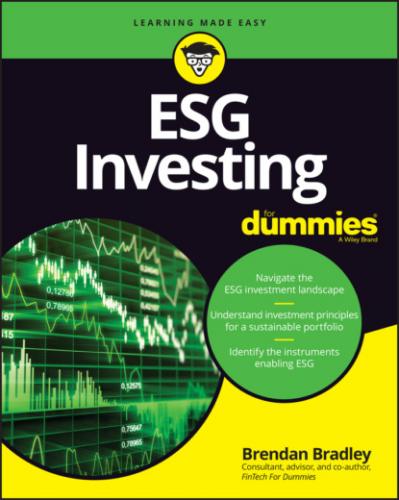261 268
262 269
263 270
264 271
265 272
266 273
267 274
268 275
269 276
270 277
271 278
272 279
273 280
274 281
275 282
276 283
277 284
278 285
279 286
280 287
281 288
282 289
283 290
284 291
285 292
286 293
287 294
288 295
289 296
290 297
291 298
292 299
293 300
294 301
295 302
296 303
297 304
298 305
299 306
300 307
301 308
302 309
303 310
304 311
305 312
306 313
307 314
308 315
309 316
310 317
311 319
312 320
313 321
314 322
315 323
316 324
317 325
318 327
319 328
320 329
321 330
322 331
323 332
324 333
325 334
326 335
327 336
328 337
329 338
330 339
331 340
332 341
333 342
334 343
335 344
336 345
337 346
338 347
Introduction
Welcome to the ESG community! Thanks for picking up this book, in which I explain the ins and outs of ESG investing. As you may know, ESG stands for environmental, social, and governance, and perhaps the reason for your interest is the growing evidence that ESG factors can be integrated into investment analysis and portfolio construction to offer investors long-term performance advantages. Also, ESG criteria are used by socially conscious investors to screen investments and assess a company’s impact on the world. You want to know that the companies you’re investing in are “doing the right thing” or “doing no harm” as well as producing a positive return on investment.
With growing action from governments, companies, and investors to consider environmental and societal impacts, it seems inevitable that ESG considerations will be included in all of our investment decisions at some point in the future. Given that companies with high ESG ratings exhibit a lower cost of capital, less volatile earnings, and lower market risk than companies with low ESG ratings, sustainability should be our new standard for investing. Furthermore, all collective investment funds may be compelled to consider ESG criteria in their investments, alongside traditional financial factors.
However, be aware that there are many challenges to surmount before you reach the “promised land.” There is still a lack of common sustainability criteria, standardization of disclosure requirements, and therefore ESG ratings that can be questioned from a multitude of different rating providers. In short, the available data and the methodology behind ESG criteria for investment products is still opaque, and investors should carefully monitor what’s “under the hood” and not be victims of “greenwashing.”
About This Book
In writing this book, my primary aim is to educate potential ESG investors about the opportunities, but not to forget the potential risks. Many ESG-related books have been written, but the landscape has changed so much in just the last year that I felt there was a need to update investors, and also to be wary of the hype and not get caught up in the fear of missing out. So I focus in certain chapters on the developments around improvements in disclosure, leading to better data quality and more informed ratings of given companies, which in turn leads to better investment products. While the asset management industry is focused on voluntarily reaching these goals, given the “wall of investment” flowing into this space, there will also be increasing regulatory requirements to mandate behavior.
The idea here is to provide a pragmatic look at the most important aspects of ESG investing and highlight that this approach to responsible investment can help companies provide strong returns while helping to make the world a better place.
A quick note: Sidebars (shaded boxes of text) dig into the details of a given topic, but they aren’t crucial to understanding it. Feel free to read them or skip them. You can also pass over the text accompanied by the Technical Stuff icon. The text accompanied by this icon offers some interesting but non-essential information about ESG investing.
One last thing: Within this book, you may note that some web addresses break across two lines of text. If you’re reading this book in print and want to visit one of these web pages, simply type in the web address exactly as it appears in the text, pretending the line break doesn’t exist. If you’re reading this as an e-book, you’ve got it easy — just click the web address to go directly to the web page.
Foolish Assumptions
I wrote this book so that all investors can understand it, but I
